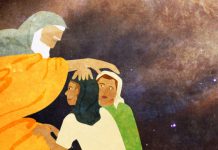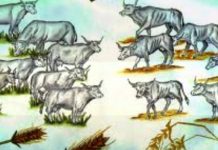Tales of the Talking Donkey!
“Mrs. Ed, you silly donkey!” cried Bilaam the Grand Wizard of Midian. “This is the third time you have played this sit-down game on me! What do you think this is – a college campus demonstration?! I’ll show you where this behavior will get you,” Bilaam proclaimed as he whacked the donkey with a cane.
Meanwhile, Bilaam’s prominent travelling companions, the emissaries of the Great King Balak of Moab, had no clue what was happening. Bilaam offered them excuses, “This isn’t really my regular mode of transportation. My horse is temporarily out of commission. The donkey is a recent acquisition and tends to make trouble.”
Suddenly, out the clear blue sky, Mrs. Ed opened her mouth and began to speak. “Why have you beaten me 3 times? What have I done to you?” The onlookers were dumbstruck, “What a miracle! A talking donkey!” (preempting CBS by more than 3000 years!)
Bilaam answered the beast as if responding to a recorded message: “Because you defied me. If I only had a sword, I would kill you!”
Mrs. Ed replied, “Tell me, Bilaam. Have I not been your trusted donkey my entire lifetime? Have I ever acted like this before?”
Bilaam was forced to admit the truth: He had lost a debate with a donkey! (Midrash – Numbers 22:28)
In this week’s portion, the scene changes to the land of Moab where the grand wizard Bilaam unsuccessfully tries to curse the Jewish people and ends up blessing them instead.
__________
BILAAM THE PROPHET
G-d gave the non-Jews a prophet so they would have no excuse if they failed to serve G-d. In the end, Bilaam caused the people to be more immoral then they had already been. Yet amazingly, Bilaam defined the essence of the Jewish people even more than the Jewish prophets did! In fact, the first prayer a Jew recites upon entering the synagogue, “Ma Tovu,” is taken from the words of none other than Bilaam.
BALAK THE KING
The distinction of having a Parsha in the Torah named after Balak is not to be taken lightly. Either the merit of the sacrifices he sincerely brought to G-d (although the intention was to curse the Jews), or the merits of his illustrious descendents (Ruth the Moabite and eventually King David) served him well.
Balak saw the fear of his people and their distrust of their kings, and he felt he had to act. So he took advice from the elders of Midian, who had known Moses in his youth. “His power is in his mouth,” (meaning spirituality) they informed him. Balak proclaimed: “In that case we must fight fire with fire and find someone spiritual to do battle with him.”
Bilaam had become famous in a previous war between Moab and giant King Sichon, in which the “curse of Bilaam” had won the war for Sichon. Upon learning of this, Balak sent Bilaam a message: “I know that whom you bless is blessed and whom you curse is cursed. Please curse this nation (the Jews) and get them to leave the Mideast region.” (Sound familiar?)
BILAAM’S VISION
G-d appeared to Bilaam and asked: “Who are these people accompanying you today?” The purpose of this was to open a conversation, analogous to G-d’s famous questions: “Where are you Adam?” and “Cain, where is your brother?” Bilaam, although a monotheist, was still affected by the idolatry surrounding him, and he wrongfully believed that G-d had human traits. “He doesn’t know everything, and when He’s not looking I’ll be able to curse them,” Bilaam thought. The message of G-d to Bilaam was loud and clear: “Do not curse the Jews because they are blessed!” (Numbers 22:12)
Had Bilaam been honest, he would have reported to Balak’s men the message, “Don’t try to curse or harass them in any way. On the contrary, be friendly to them.” Instead, Bilaam informed them only that he could not go with them – implying that they were not “high-ranking” enough for the effort.
Balak in turn, sent a higher-ranking delegation, and this time G-d responds to Bilaam, “If you think you stand to profit from this venture, you may go. But only what I tell you, will you recite.” The meaning of this was, “I might tell you to bless them.”
Had Bilaam conveyed this message, Balak probably would have said, “Forget the whole thing.” Bilaam saw the Jews as competition for G-d’s favor, and therefore hated the Jews more than Balak who was motivated by fear. Whoever produces a substitute product, wages a campaign to get the original off the market!
Bilaam asked G-d to totally destroy the Jews, which was his intention from start to finish.
CONFRONTING THE ANGEL
Bilaam woke up early, saddled his own donkey (competing with Abraham who beat him to it), and went with Balak’s men, without saying a word. They erroneously assumed that G-d had changed his mind (a common human mistake attributed to G-d by some major religions). G-d was now angry that Bilaam was on his way (even though He just gave him permission) because of the false impression he made, and sent an angel of mercy to stop him.
The donkey perceived the angel, but Bilaam did not. Bilaam beat the donkey until G-d opened its mouth, and it became clear that Bilaam had lost the debate. Finally, Bilaam saw the angel and bowed down prepared to cancel his mission. The angel demanded to know, “Why did you beat your donkey?”
Question: Balaam was about to curse an entire nation, and yet the angel sent to stop him is obsessed by his abuse of his donkey. Why?
Answer: The angel meant, “Don’t you know an omen when you see one? Obviously this is message from Heaven. However, if you insist on going, you still have the free will to do so.” Our Sages teach: “On the path of life a person chooses, so he is led!” Just don’t forget: “Whatever I tell you, shall you say.” In life also, we often find ourselves in situations in which we perceive only the donkey and fail to see the angel! (Rabbi Shlomo Wolbe)
The commentators explain that the purpose of the donkey incident was to impress upon Bilaam that human speech (and that of a donkey) are in the hands of G-d.
Another point is that Bilaam was about to become the spokesman for the Almighty to define the essence of the Jewish people. He was so conceited and driven to physical pleasures (his idea of “honor” consisted of a palace full of silver and gold!) that he needed a major shot of humility in order to represent G-d.
Losing the debate to the donkey was a “humbling experience” not soon forgotten by Bilaam!
BUILDING ALTARS
Bilaam demands that Balak build altars and bring offerings, so that G-d
THE BLESSINGS OF BILAAM
(1) Not to be cursed: “How can I curse them when G-d is not angry with them?” (Numbers 23:8) Even when they may have deserved a curse (such as when Jacob fooled his father, or when Jacob was upset with Shimon and Levi for wiping out the city of Shechem), they did not receive one. Isaac said, “He should also be blessed.” Jacob only cursed their anger.
Bilaam said: “I see them firmly set into bedrock and mountains” (an allusion to the matriarchs and patriarchs), “they are separate from the other nations” (judged by a totally different standard), and “May I die a death of the just, and have my end like theirs!” Bilaam wanted to die like a Jew – yet to live as a Jew was just too hard!
(2) G-d is flawless: “G-d is not a human that changes His mind. He does not see corruption in the nation of Israel. The place of the Jews is together with G-d and the friendship of the king is in their midst. They are not sorcerers or black magicians, but actively relate to the Almighty. They rise up like a lioness and do not retire until they have beaten their adversaries.” (Numbers 23:19)
The Sages see a hint that Jews keep the Torah, they rise up in the morning with energy to put on “Tallit and Tefillin,” and in the evening they recite the Shema on their beds – and in this merit they beat their enemies.
(3) The final blessing: Bilaam reached the level of prophecy that only Moses had attained and could not control his excitement! He looked out over the Jewish camp in order to awaken upon them the sin of the Golden Calf. In the end, Bilaam was so impressed by the Jews’ modesty (every tent faced a different direction so no one could see into their neighbor’s house!) that he proceeded to sincerely bless them. Bilaam concluded that they will utterly destroy their enemies and in the end, “Those who bless you are blessed and those who curse you are cursed!” (Numbers 24:9)
This was the end of the show, because now Bilaam could not curse them anymore. Balak was very upset with Bilaam, who responded by predicting the future, and giving him some deadly advice (as we will see next week). Bilaam then left ignobly, to be mentioned again later.
Question: Why did G-d want the essence of Jews to be expressed specifically by this non-Jewish prophet?
Answer: The prophecies of Bilaam reverberate throughout the generations. G-d wanted the nations of the world to hear from their own prophet about the greatness of the Jewish people, so they would learn from the Jews. Yet the Jews still must learn of their own greatness. Our prophets were often involved in constructive criticism to help us become greater, and spent less time patting us on the back. Bilaam revealed the greatness of the Jews and their close relationship with the Almighty for all times!














